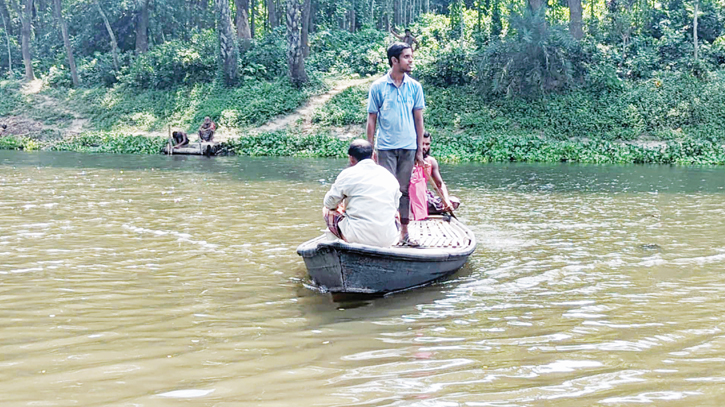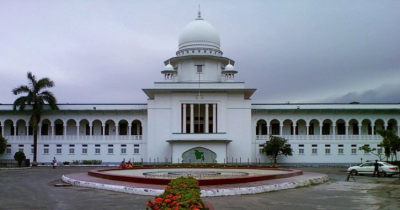
The absence of a bridge over the Kumar River in Madhukhali Upazila of Faridpur forces the locals to depend on boats for daily activities. Photo: Messenger
For over four decades, the residents of seven villages in the Madhukhali Upazila of Faridpur have relied solely on boats for transportation. Despite this long-standing need, they have yet to receive a bridge over the Kumar River, resulting in persistent hardships and risks throughout the year.
The absence of a bridge forces the locals to depend on boats for daily activities, making it impossible to transport produce and vegetables to the market. During the rainy season, communication is completely cut off, causing severe difficulties for students and the sick.
The Kumar River flows through the villages of Raipur, Bakshipur, Paikandi, Barobhagia, and others in the Madhukhali Upazila. The bamboo bridge connecting Kaliganga and Bangabaria Bazaar often collapses shortly after repair, leaving boats as the only mode of transportation for the residents on both sides.
Sajjad Hossain, a resident of Bakshipur village, expressed the community's longstanding demand: "For almost 40 years, we have been asking for a bridge between Kaliganga and Bangabaria Bazaar. I appeal to the honorable minister to provide us with a bridge."
Shyampada Das, a businessman at Bangabaria Bazaar, shared his struggles: "I have been doing business here for a long time. The absence of a bridge at Kaliganga means we have to endure the daily hassle of crossing by boat, which causes various problems."
Madhukhali Upazila Chairman Muraduzzaman Murad said that the issue has been reported to Abdur Rahman, the honorable minister of the Ministry of Fisheries and Livestock. "I am personally aware of this matter. I hope the problem will be resolved soon, and the public will benefit from it," he said.
The persistent need for a bridge has left these communities isolated and struggling. Without a reliable means of transportation, economic development is stifled, and residents face daily challenges. The lack of infrastructure has been a barrier to progress, hindering access to education, healthcare, and markets. The ongoing dependence on boats is not only inconvenient but also poses safety risks, especially during adverse weather conditions.
Addressing this issue is crucial for improving the quality of life for the residents of these villages. A bridge over the Kumar River would provide a lifeline, connecting communities and fostering economic growth. The call for action is clear, and it is imperative that the authorities prioritize the construction of this vital infrastructure to alleviate the hardships faced by the people of Madhukhali Upazila.
The absence of a bridge has broader implications for the social and economic well-being of the Madhukhali Upazila's residents. Children face difficulties attending school, often risking their lives crossing the river in precarious conditions. Healthcare access is severely restricted, with emergencies becoming life-threatening due to the inability to quickly reach medical facilities. This situation perpetuates a cycle of hardship, preventing these communities from achieving their full potential.
The construction of a bridge would not only improve transportation but also stimulate local economies by facilitating trade and commerce. Enhanced connectivity would attract investment, create job opportunities, and promote overall regional development, offering a brighter future for the residents of Madhukhali Upazila. The call for a bridge is not just a plea for infrastructure but a demand for dignity, safety, and the opportunity for a better life.
Messenger/Fameema








